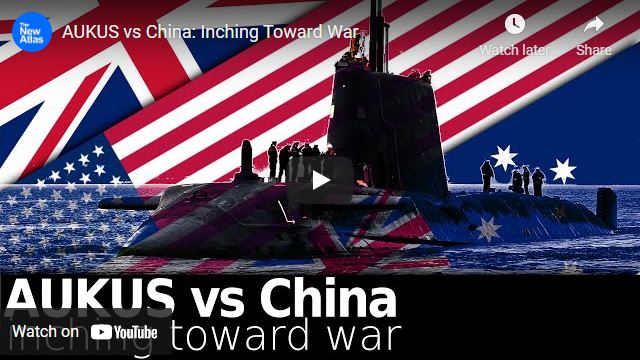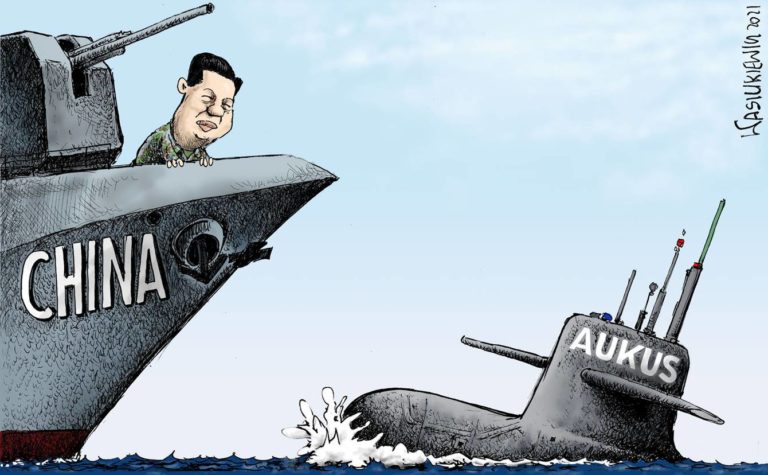
China Lashes Out at “Confrontational Encirclement” with Nuclear-powered Weapons on its Doorstep
Ted Snider / Responsible Statecraft
(March17, 2023) — On September 15, 2021, the U.S. announced a commitment “to a shared ambition to support Australia in acquiring nuclear-powered submarines for the Royal Australian Navy.”
This week that commitment matured to its next phase with a major summit of AUKUS (top officials from Australia, UK and the United States) and the announcement of the U.S. plan to provide Australia with nuclear-powered submarines.
According to a White House Fact Sheet, the arming of Australia with nuclear-powered submarines will take place in phases, beginning with Washington selling Australia three Virginia class submarines in the early 2030’s with the potential sale of two more. The next phase, to be completed a decade later, will see Australia using SSN-AUKUS nuclear-powered submarines jointly built by the UK and Australia and using advanced U.S. technology.
For its part, China says that “The latest joint statement from the U.S., UK and Australia demonstrates that the three countries, for the sake of their own geopolitical interests, completely disregard the concerns of the international communities and are walking further and further down the path of error and danger.”
The plan to place nuclear-power submarines in close proximity to China in a security grouping whose mission is to contain China reinforces Beijing’s complaint that Washington is encircling it by forming Cold War-style blocs, and that Washington is pursuing its security interests at the expense of the security interests of other countries — moves that are leading to “conflict and confrontation.”
The U.S. has repeatedly claimed to be the defender of “the rules-based international order” and has accused China of being “the most serious long-term challenge to the international order” which increasingly has “the economic, diplomatic, military, and technological power to do it.”
But while China is negotiating peace in the Middle East and urging peace talks in Ukraine, the U.S. is preparing to spend $842 billion on its military in 2024 and expanding its access to bases in the Philippines, leading Chinese President Xi Jinping to criticize it for “implementing all-round containment, encirclement and suppression” of China.
At the forefront of that encirclement is the arming of Australia in preparation for its becoming the southeastern outpost of AUKUS, a trilateral security pact that is intended to ensure “stability in the Indo-Pacific over the long term,” according to Biden.
“The ability of the United States Navy to be able to do forward-based repair and maintenance is critical to us,” according to Navy Secretary Carlos del Toro. “[I]t’s part of why we’re actually proceeding down the AUKUS path as well, too, with regards to submarine capability in the future.” He says that the U.S. Navy envisions Australia becoming a submarine hub for everything from submarine production and repairs to missions.
China has further charged that the plan flouts the Nuclear Non-Proliferation Treaty (NPT). One day after the AUKUS summit, the Chinese mission to the UN said that the sale of nuclear-powered submarines is “clearly violating the object and purpose of the NPT.” China says that the “nuclear submarine cooperation plan released today by AUKUS is a blatant act that constitutes serious nuclear proliferation risks, undermines international non-proliferation system, fuels arms races, and hurts peace and stability in the region.”
Biden has dismissed China’s concern, noting that the submarines will be “nuclear-powered, not nuclear-armed.” Australia’s Minister of Foreign Affairs, Penny Wong, also said that China’s accusations are “not grounded in fact.” She said that Australia has been “very clear” that it does not seek to acquire nuclear weapons, and that “a number of other countries have” nuclear-powered submarines – and they were allowed under the NPT.”
But the U.S. and Australia are being slippery in their remarks, and the truth is somewhere in between.
Wong is right that “a number of other countries” have nuclear-powered submarines. But the number is five, and they are the five original nuclear weapons states. No non-nuclear weapons state has acquired a nuclear-powered submarine, yet.
And while it is true that the Australian submarines will be “nuclear-powered, not nuclear-armed,” that doesn’t mean that they won’t at least rub up against the NPT.
The White House Fact Sheet says that Australia “will not . . . seek to acquire nuclear weapons.” It says that Australia will not enrich its own uranium. The U.S. and U.K. will provide the nuclear material in “welded power units” that “cannot be used in nuclear weapons without further chemical processing, which would require facilities that Australia does not have and will not seek.” The U.S. has “consulted regularly with the IAEA,” which is satisfied “with the engagement and transparency shown by the three countries thus far.”
But that does not mean that China is wrong that the deployment of nuclear-powered submarines in its vicinity is confrontational and provocative nor does it mean they are wrong that the provision of nuclear-powered submarines to Australia challenges the NPT.

The AUKUS agreement pushes hard against the borders of Article 4.1, which guarantees non-nuclear weapons states like Australia the use of “nuclear energy for peaceful purposes” and Article 4.2, which permits exchange of nuclear equipment “for the peaceful use of nuclear energy.” But nuclear-powered submarines are necessary only for attack purposes and not “for peaceful purposes,” according to Frank von Hippel, senior research physicist at Princeton University and a specialist in nuclear power, nuclear energy and nuclear arms control and proliferation.
Nonetheless, von Hippel explained to me in a personal correspondence, supplying Australia with nuclear-powered attack submarines does not violate the NPT outright because of the “submarine loophole.”
Under the NPT, non-nuclear weapon states cannot make nuclear explosive devices, and all nuclear materials for peaceful purposes must be placed under International Atomic Energy Agency (IAEA) safeguards. But in 1972, the “submarine loophole” was inserted. Called the “Non-Application of Safeguards to Nuclear Material to Be Used in Non-Peaceful Activities,” the loophole allows non-nuclear states to remove nuclear materials from IAEA monitoring for any military purpose other than the “production of nuclear weapons or other nuclear explosive devices.”
That means nuclear-powered submarines. Despite Wong’s deceptive reference to “a number of other countries,” the current AUKUS agreement is the first time the submarine loophole has ever been invoked.
Furthermore, though international law allows non-nuclear weapons states to acquire nuclear-powered submarines, “it discourages other countries from providing enriched uranium for non-peaceful activities.”
As the White House Fact Sheet says, the U.S. and U.K. will provide Australia with enriched uranium. Von Hippel told me that providing the enriched uranium “does undermine the nonproliferation regime” and is especially concerning because “U.S. and UK submarines are fueled with weapon-grade uranium rather than the low-enriched uranium used by France and China.” U.S. submarines are powered by very highly enriched 93.5% weapons grade uranium; Chinese submarines are powered by low enriched uranium.
James Acton, co-director of the nuclear policy program at the Carnegie Endowment for International Peace says that the three countries have “done a very good job engaging with the IAEA,” but, he says, “I still think there is real and concrete harm done.” The concern, he says, is not that “Australia would misuse that fuel, but that other countries would invoke AUKUS as a precedent for removing nuclear fuel from safeguards.”
Other arms control experts have expressed similar concerns, saying, according to reporting by the Associated Press, that the “deal could open the door for other nuclear-armed countries to pursue nuclear transfers to third-party countries, and could set a precedent that would make it harder for international regulators to guard against the illegal trafficking and use of nuclear material.”
Overall, Monday’s announcement sharpens confrontation with China and strains the NPT at a time when the world needs no more confrontation between superpowers and no more threat to nuclear restraint and non-proliferation.
Posted in accordance with Title 17, Section 107, US Code, for noncommercial, educational purposes.